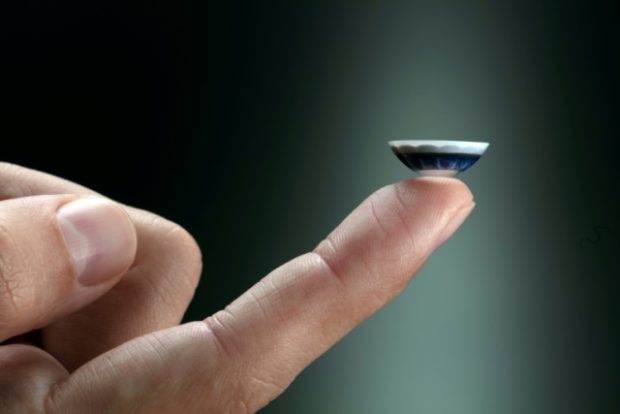‘Invisible computing’ startup unveils smart contact lens

Mojo Vision, a California startup, says its smart contact lens is part of a move to “invisible computing.” Image: Courtesy of Mojo Vision via AFP
A startup focused on “invisible computing” unveiled Thursday a smart contact lens that delivers an augmented reality display in a user’s field of vision.
The Mojo Vision contact lens offers a display with information and notifications, and allows the user to interact by focusing on certain points.
The rigid contact lens, which the company has been developing in stealth mode for some 10 years, may also be used to help people with visual impairments by using enhanced image overlays, and has obtained United States approval for testing it as a medical device.
“Mojo has a vision for invisible computing where you have the information you want when you want it and are not bombarded or distracted by data when you don’t,” said chief executive Drew Perkins.
In a demonstration to an Agence France-Presse reporter, company executives showed how the contact lens could enable users to see a virtual teleprompter, navigation instructions or other interactions that appear floating in the field of vision by projecting a micro-LED display to the retina.
A user, wearing two lenses which may be fitted with a correction prescription, could “click” by concentrating on an icon — to launch a music player, for example — and turn off by looking away.
Mojo said it had no timetable for a commercial launch. But it has received approval from the U.S. Food and Drug Administration as a “breakthrough” device to test the contact lens to help people with visual impairments such as macular degeneration or retinitis pigmentosa.
“These are people who are underserved by technology today,” said Steve Sinclair, senior vice president of the startup based in Saratoga, California.
The company said the contact lens is designed to provide overlays that augment sight for people with “low vision” and may assist in mobility, reading and other functions.
Mojo has raised $100 million and has executives with experience at Google, Apple and other Silicon Valley firms, with opticians and ophthalmologists also working on the project.
The contact lens aims to enable people to move away from physical devices and interact more naturally with technology. It also could have business applications, allowing workers or specialists access to real-time information in their field of vision without a bulky headset.
A challenge has been to pack into the lens the complex circuitry, image sensor, wireless radio and battery needed for the wearable device.
Executives said the current version would transmit and receive information wirelessly through a portable relay box which could be clipped to a belt, but they hope to link directly to smartphones in the future.
The company will be testing its vision-enhancing applications with the Vista Center for the Blind and Visually Impaired in Palo Alto. RGA
RELATED STORIES:
Flushed contact lenses are big source of microplastic pollution
Patient stuns doctors with 27 contact lenses found in one eye